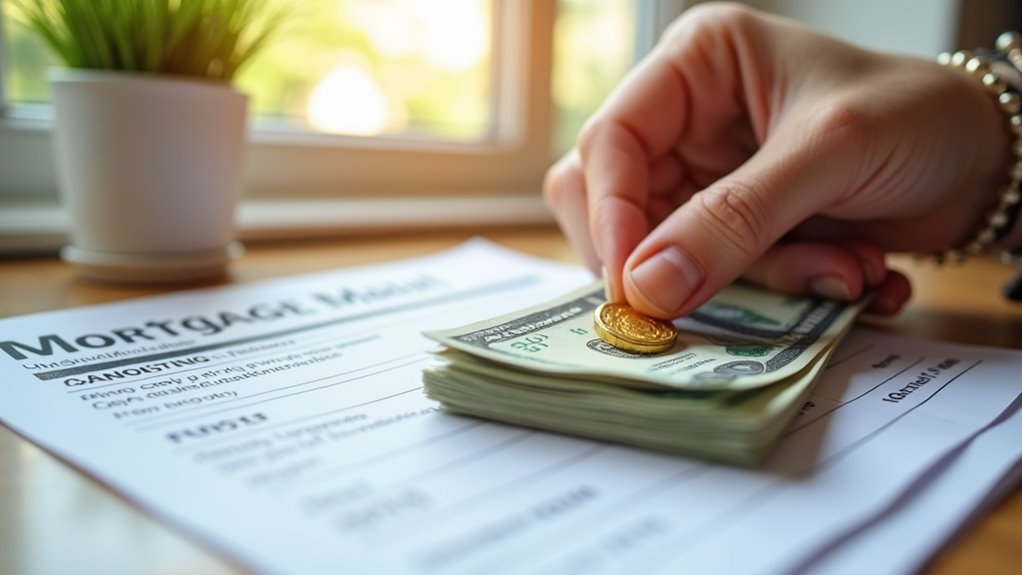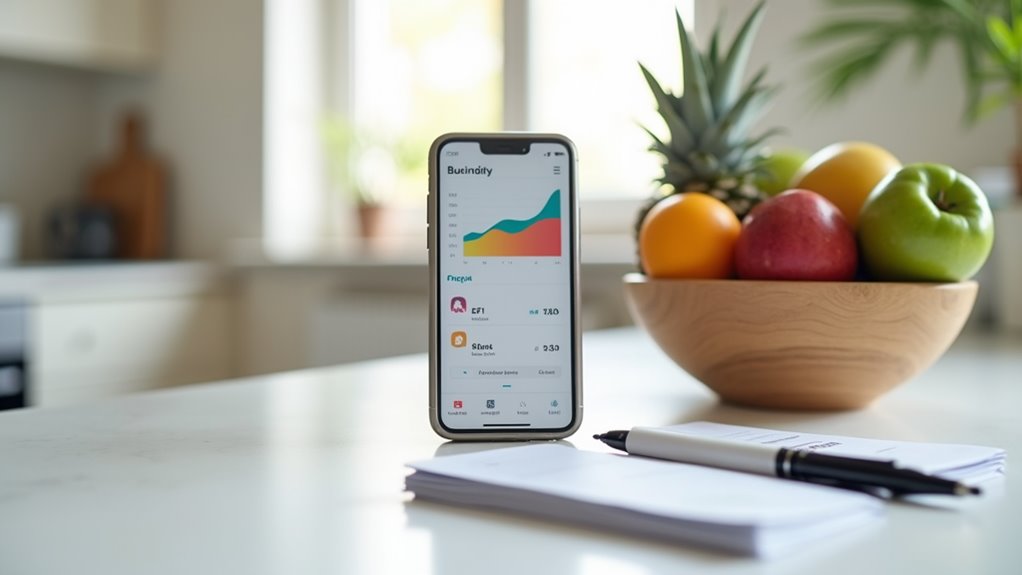
To pay off your mortgage early, consider making extra payments toward the principal. You can also refinance to a shorter loan term or utilize windfalls like bonuses and tax refunds for lump-sum payments. Switching to a biweekly payment plan can further accelerate your progress, and don't forget to cut unnecessary expenses to free up more funds. There are many effective strategies to enhance your financial freedom, and you'll discover even more useful tips ahead.
Key Takeaways
- Make extra payments towards the principal to reduce the loan balance and total interest paid, potentially shortening the mortgage term.
- Utilize financial windfalls, like bonuses or tax refunds, to make lump-sum payments that lower the principal and enhance cash flow.
- Consider refinancing to a shorter loan term for lower interest rates, but be prepared for higher monthly payments and evaluate closing costs.
- Implement a biweekly payment plan to make 13 payments a year, reducing the principal and saving on interest over the loan's life.
- Regularly assess your financial situation and budget to ensure that payment strategies align with your overall financial goals and stability.
Make Extra Payments Towards Principal

What it Looks like:
Making extra payments toward the principal on your mortgage can take several forms, such as contributing a little extra each month or making larger lump-sum payments periodically. For instance, if your monthly mortgage payment is $1,200, you might decide to pay $1,300 each month, directly reducing the principal amount owed. Alternatively, if you receive a bonus or tax refund, you could put that money toward your mortgage, further decreasing the outstanding balance. This strategy can greatly shorten the term of your loan and reduce the total interest paid over the life of the mortgage.
Why It's Smart:
Paying extra toward your principal can lead to substantial savings in interest payments. Mortgages are typically structured such that the majority of your early payments go toward interest rather than the principal. By making extra payments, you effectively reduce the principal balance faster, which in turn lowers the interest accrued in subsequent months. Additionally, reducing the length of your mortgage can free up financial resources sooner, allowing you to allocate funds toward other investments, savings, or even retirement. This proactive approach can lead to financial freedom and peace of mind as you work toward owning your home outright.
Things to Be Aware of:
Before committing to extra payments, it's important to check your mortgage agreement for any prepayment penalties, as some lenders may charge fees for paying off the loan early. Additionally, consider your overall financial situation; while paying down your mortgage can be beneficial, it's also vital to maintain a balanced approach to savings, retirement contributions, and emergency funds. Finally, verify that any extra payments are specifically designated for the principal; otherwise, they may be applied to future interest or escrow accounts, which would not provide the intended benefit of reducing your mortgage balance.
Refinance to a Shorter Loan Term

What it Looks like: Refinancing to a shorter loan term typically means switching from a traditional 30-year mortgage to a 15-year or even a 10-year mortgage. This process involves taking out a new loan to pay off your existing mortgage, which can lead to notably higher monthly payments due to the shorter repayment timeline. However, homeowners often find that the interest rates on shorter-term loans are lower, which can result in considerable savings over the life of the loan. For example, if you originally borrowed $300,000 at 4% interest for 30 years, switching to a 15-year loan at 3% would not only reduce the amount of interest paid but also allow you to own your home outright in half the time.
Why It's Smart: Opting for a shorter loan term can be a financially savvy move for several reasons. The most compelling advantage is the reduction in total interest paid over the life of the loan. With a shorter term, you are paying off the principal more quickly and are less exposed to interest rate fluctuations, leading to a more predictable payment structure. Additionally, having a mortgage that is paid off sooner can free up your financial resources, allowing you to allocate funds toward other investments, retirement savings, or even lifestyle upgrades. This strategy also builds equity in your home at a faster rate, which can be beneficial if you plan to sell or leverage your home in the future.
Things to Be Aware of: While refinancing to a shorter loan term has its advantages, there are several factors to evaluate before making the switch. First, the higher monthly payments can strain your budget, especially if your financial situation changes unexpectedly. It's important to verify that you have a stable income and an emergency fund in place before committing to this strategy. Additionally, refinancing often comes with closing costs and fees, which can offset some of the savings gained from lower interest rates. Finally, assess the potential impact on your overall financial goals—while paying off your mortgage early can provide peace of mind, it's crucial to balance this goal with other financial priorities, such as retirement savings and maintaining liquidity.
Utilize Windfalls and Bonuses

What it Looks like: Utilizing windfalls and bonuses to pay off your mortgage early can take many forms. This includes unexpected financial gains such as tax refunds, work bonuses, inheritance money, or even proceeds from selling unused items. Picture receiving a year-end bonus from your employer; instead of spending it on a vacation or a new car, you decide to put that extra cash towards your mortgage. By making a lump sum payment, you can greatly reduce the principal balance of your loan, which in turn decreases the total interest paid over the life of the mortgage.
Why It's Smart: Paying down your mortgage with windfalls or bonuses is a strategic financial move that can lead to substantial savings. By applying these unexpected funds directly to your mortgage, you decrease the overall loan balance, which reduces the amount of interest you will be charged in the future. This approach not only shortens the term of your mortgage but can also free up cash flow in your monthly budget as you make fewer payments over time. Additionally, eliminating your mortgage debt sooner can provide a sense of financial security and peace of mind, allowing you to redirect your funds toward other investment opportunities or savings goals.
Things to Be Aware of: While using windfalls and bonuses to pay off your mortgage can be advantageous, there are several factors to keep in mind. First, verify that your mortgage agreement does not have prepayment penalties, as some lenders may charge fees for paying off a loan early. Additionally, it's wise to assess your overall financial situation; if you have high-interest debt (such as credit card debt), it may be more beneficial to address those obligations first. Finally, consider maintaining an emergency fund; allocating all windfalls to your mortgage could leave you financially vulnerable in case of unexpected expenses. Balancing debt repayment with savings and investments is key to a robust financial strategy.
Consider a Biweekly Payment Plan

What it Looks like: A biweekly payment plan involves making half of your mortgage payment every two weeks instead of making a full monthly payment. This means that over the course of a year, you will make 26 half-payments, which equates to 13 full monthly payments. By effectively adding an extra payment each year, you can greatly reduce the principal balance on your mortgage and pay it off much earlier than the original loan term. This method can be particularly beneficial for homeowners who receive their paychecks biweekly, aligning their mortgage payments with their income schedule.
Why It's Smart: Adopting a biweekly payment plan can save you money on interest over the life of your loan. Since you're paying down the principal faster, the amount of interest accruing each month decreases, resulting in considerable savings. Additionally, this strategy can help you build equity in your home more quickly, which can be advantageous if you decide to sell or refinance in the future. The discipline of making these payments biweekly can also encourage better budgeting and financial habits, as you are consistently managing your cash flow.
Things to Be Aware of: Before committing to a biweekly payment plan, it's important to check with your lender to confirm they offer this option. Some lenders may charge fees for processing biweekly payments or may not apply the extra payment as you expect. Additionally, it's vital to review your overall financial situation to verify that making these biweekly payments fits comfortably within your budget. If your income is variable or you have other significant financial obligations, such as credit card debt or student loans, consider whether this strategy is the best fit for your financial goals.
Cut Unnecessary Expenses to Allocate More Funds

What it Looks like: Cutting unnecessary expenses involves a thorough review of your monthly budget to identify areas where you can reduce spending. This may include canceling unused subscriptions, dining out less frequently, or finding cheaper alternatives for regular purchases. For example, you might choose to brew coffee at home instead of buying it from a café every morning. By reallocating these savings, you can direct more funds toward your mortgage payments, allowing you to pay off your mortgage early and save on interest over time.
Why It's Smart: Allocating more funds toward your mortgage not only helps you pay it off quicker but also reduces the amount of interest you will pay over the life of the loan. Most mortgages are structured so that the majority of your early payments go toward interest rather than principal. By cutting back on unnecessary expenses and directing that money toward your mortgage, you can make larger payments that notably chip away at the principal balance. This strategy not only accelerates your path to homeownership freedom but also builds equity at a faster rate, providing you with more financial stability in the long run.
Things to Be Aware of: While cutting expenses can be an effective strategy, it's important to strike a balance so you don't compromise your overall quality of life. Be cautious of overly restrictive budgeting that could lead to burnout or dissatisfaction. Additionally, verify you're still contributing to essential savings and investment accounts, such as retirement or emergency funds. Finally, remember that some mortgage agreements may have prepayment penalties; always review your loan terms before making extra payments to avoid any unexpected fees.
RELATED POSTS
View all


